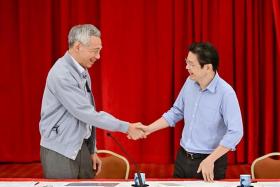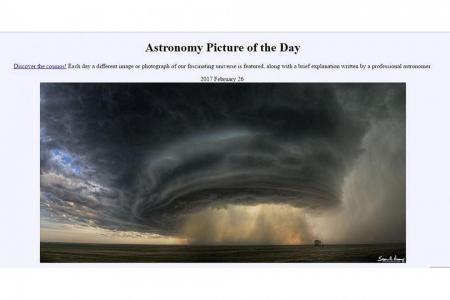PM's vision: A more tech-savvy Singapore
Cashless payments in hawker centres and more soon
Singaporeans can expect a national digital identity, cashless payments in hawker centres and a transport system that is more responsive to changes in demand in the near future.
Prime Minister Lee Hsien Loong sketched out this vision of how he sees technology playing a greater role in improving life here at a recent closed-door dialogue. His office released a transcript yesterday.
And there is a lot more that the Government, businesses and people can do to seize the opportunities that new technology creates, he added.
The need to innovate and build strong digital capabilities is a key strategy of the Committee on the Future Economy (CFE), which released its report this month, and the Budget contained several measures to help on this front.
Ministers will elaborate on these plans when Parliament debates the Budget this week and the next.
Implementation will be key, Mr Lee said.
Technology is a key focus because, while there are manpower and space constraints, "in terms of ideas, productivity, breakthroughs, the constraint is only what the human mind can come up with, what people can organise and deliver".
Mr Lee's dialogue last Friday with 150 start-up founders and guests from across the Asia-Pacific region was part of Camp Sequoia, an annual tech summit organised by venture capital firm Sequoia Capital India.
He said technology is an area Singapore has an advantage in, as a compact city with high-quality infrastructure and tech-savvy people.
Its Smart Nation Programme Office was set up to spearhead the use of technology and key projects that "will make a big difference to the way Singapore is able to operate".
NOT FAST ENOUGH
Mr Lee added: "I think personally that, for all our pushing, we really are not moving as fast as we ought to."
He outlined several other projects under way, including a national sensor network that pulls together pictures from cameras monitoring traffic, drains and housing estates into an integrated data source.
As for a national digital ID system, he cited how Estonia has a digital access card for all secure e-services, including national health insurance, bank accounts, making digital signatures and Internet voting.
Asked which policies had the most impact in fostering start-ups here, Mr Lee listed four strategies:
- Creating a pro-business environment where companies can set up shop easily.
- Creating an ecosystem to support start-ups, from having incubators to encouraging venture capitalists and angel investors to invest.
- Being open to foreign talent. "It does not mean that there is no wary observation by Singaporeans: Who is coming in, are they real talent or not, are there too many or not? But we do make ourselves open to talent and that is critical," he said.
- Producing people with technological know-how by focusing on science, technology, engineering and mathematics subjects.
The CFE has recommended a Global Innovation Network for young people to gain exposure to start-ups abroad and be inspired to start their own things, Mr Lee noted.
"The problem is not lack of resources from the Government," he said.
"Really what is needed is the talent, the drive. And we just have to get out of the way and enable you to do that."
Mr Lee noted that Singapore has built up trust between its Government and people because economic growth has benefited most people.
But as the economy slows, the Government has to convince people to work together to attain 2 to 3 per cent growth, which is good by any international standard, he added.
For if society splits, "Singapore would become a very unhappy and much, much less successful place. It is our responsibility as a government to have policies which will not let that happen," he said.
Highlights from PM Lee's dialogue
ON THE OUTLOOK FOR SINGAPORE
It is a challenging time for a country like Singapore, trying to find an economic strategy that will work for an economy, for a nation, not just for companies in it, but for the population and for citizens.
We are doing our own think exercise. We produced a report by the Committee on the Future Economy (CFE), which came out a couple of weeks ago.
We had the Budget this week, which set out some of the strategies to realise the ideas we have. None of them are rocket science. The key is whether or not you can make it happen.
And to make it happen faster than others, execute and bring everybody on board and see that this is the right strategy, which will work and benefit everybody.
(Technology) is in fact one of our areas of focus.
In terms of physical growth, numbers, space, we reach constraints. But in terms of ideas, productivity and breakthroughs, the constraint is only what the human mind can come up with, what people can organise and deliver.
ON WHAT KEEPS HIM AWAKE AT NIGHT
Some of the things that keep you up at night, you cannot do anything about. We spent a lot of time worrying about the US presidential election. There are other things that can go bump in the night because we are in uncharted waters.
There is a major change of direction in the US. Other powers will react, and how does that interaction work out?
If it is a rebalancing, that is manageable. If it is destabilisation, you do not know what the consequences are. That is one big global uncertainty.
Within the region, we also watch very carefully the trends and our neighbouring countries. Whether they are focused on regional cooperation and integration, or whether their focus is on economic nationalism - like the mood in the US and the developed countries...
We also have to watch our own domestic population trends, our demographic trends. That worries us a great deal, and again, it is something with no easy solution. Our birth rate is too low...
ON WHAT HE DOES ON THE INTERNET
I have on my desktop the news websites open: BBC, New York Times, The Straits Times, Channel News Asia. They are there all the time. Because of that, I do not watch the television news anymore...
I have Facebook open and Instagram, because I have accounts.
I track what is happening to my posts, what people are saying, and whether we have to respond to it or not. It is quite useful, because without those, I would not reach out to significant segments of the population, here and overseas...
I look at a page called Astronomy Picture of the Day. Every day there is a picture, a nebula, a supernova, the sun, rings of Saturn, something like that.
I sometimes look at blogs by mathematicians to track what they are doing...
I look at photography websites because I take pictures. You pick up ideas looking at what people do, how they take the pictures. - THE STRAITS TIMES
FOR MORE, READ THE STRAITS TIMES TODAY
Get The New Paper on your phone with the free TNP app. Download from the Apple App Store or Google Play Store now




